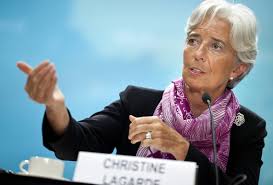The Managing Director, International Monetary Fund, Christine Lagarde, on Thursday expressed concern that the high debt levels that low-income countries have built up through non-traditional sources could complicate any debt restructuring.
Lagarde, who gave this charge at a sovereign debt restructuring conference at the IMF’s headquarters in Washington, DC, therefore canvassed the need for bilateral creditors to collaborate more in areas involving debt restructuring, particularly among not traditional creditors.
A news report by Reuters quoted the IMF leader as saying that “we need better collaboration to prepare for debt restructuring cases that involve non-traditional lenders.
“With substantial non-Paris Club debt, we need to think about new ways in which official creditor coordination – often so critical to debt crisis resolution – can take place. Building trust in sovereign borrowers is now more important than ever, especially in low-income counties”, Lagarde added.
According to her, with 40 percent of low-income countries already facing “significant debt challenges, the shift towards new borrowing sources generally means higher interest rates and shorter maturities.
Lagarde said. “Borrowing from non-Paris Club lenders also means that creditor coordination will likely become more complicated. Managing these debt vulnerabilities is critical.”
She also urged borrowers and their new creditors to be more transparent about their liabilities.
The IMF chief expatiated further: “A key challenge is preventing ‘debt surprises’, which can be driven by poor governance, off-balance sheet borrowing, and weak debt recording and reporting.
“There is room to significantly strengthen the institutions that record, monitor, and report debt in individual countries. One-third of low-income countries do not report debt guarantees for state-owned enterprises; and fewer than one in 10 report debt of public enterprises.
“Greater transparency can help prevent these contingent liabilities from turning into massive government obligations”, she projected.
Recalling that this happened in Mozambique in 2016, when it was unable to keep servicing its US$727m 2023 bonds after several sovereign-guaranteed loans were disclosed, Lagarde noted that “we have seen a sharp rise in the number of cases where debt contracts are not publicly disclosed by either the borrower or the lender.
“By working together, both parties can ensure better disclosure, which reduces risk and increases accountability”, the IMF managing director added.
Recently, China in particular has become a major provider of credit to such countries but it is not a member of the Paris Club of bilateral lenders, which has developed guidelines on how to restructure any such debts. For instance, it is the biggest single creditor of Venezuela.






